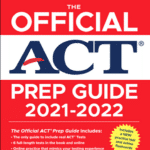
What do you need to know about the ACT format? The ACT test is comprised of four core test sections: English, Math, Science, and Reading. There is also an optional Writing Test. This page covers everything you need to know about the ACT sections with links to additional useful resources.
ACT Sections in a Nutshell
| ACT Test Section | Number of Questions | Duration | What’s tested? |
|---|---|---|---|
| English | 75 | 45 minutes | Grammar, punctuation, sentence structure, rhetorical skills |
| Math | 60 | 60 minutes | Pre-algebra, elementary algebra, intermediate algebra, coordinate geometry, plane geometry, basic trigonometry |
| Science | 40 | 35 minutes | Science-based passages with graphs, charts, tables, and research summaries |
| Reading | 40 | 35 minutes | Prose fiction, social studies, humanities, natural sciences-10 questions per passage |
| Writing (Optional) | 1 | 40 minutes | One essay |
ACT English Test
The ACT English section (or, as the ACT refers to it, the ACT English test), primarily looks at your understanding of standard English grammar, mechanics, and usage, as well as the elements that make up strong writing: language use as it relates to style, tone, and voice.
Here’s what you need to know about the ACT English section:
- Section on ACT: 1
- Time: 45 minutes
- Number of questions: 75
- Question types: 3
- Production of Writing (development and organization): 22-24 questions
- Knowledge of Language (style): 10-14 questions
- Conventions of Standard English (grammar and punctuation, sentence structure): 38-42 questions
- Score scale for ACT English: 1-36
All of these questions are passage-based, though some may have to do with underlined portions of the passage (words or phrases) and others may have to do with paragraphs, sections, or passages as a whole.
ACT Math Test
The ACT Math section tests math most high school students have seen by junior year. In other words, there’s no calculus here: the test’s “easiest” problems start with pre-algebra and max out with basic trig. The hard questions tend to be hard because of the thought processes and logic involved in them, not because they contain particularly complex concepts.
Here’s what you need to know about the ACT Math section:
- Section on ACT: 2
- Time: 60 minutes
- Number of questions: 60
- Content areas: 6
- Pre-algebra
- Elementary algebra
- Intermediate algebra
- Coordinate geometry
- Plane geometry
- Basic trigonometry
- Score scale for ACT Math: 1-36
You can use a calculator on ACT Math–but you’ll be going so fast (1 question a minute) that you’ll want to make sure you use it smartly. Practice is crucial!
Also, unlike SAT Math, ACT Math will not give you a list of formulas. So practice putting those math formulas to use well before test day! Simple memorization won’t cut it here–put them to practice.
ACT Reading Test
ACT Reading is a passage-based section. You’ll read passages and answer multiple-choice questions on each one. While this isn’t exactly like what you do in your English classes (you’ll likely never have seen these questions before), it’s absolutely possible to develop the skills in your ACT prep to master an entirely new passage with gusto!
Here’s what you need to know about the ACT Reading section:
- Section on ACT: 3
- Time: 35 minutes
- Number of passages: 4 (fiction, social science, humanities, and natural science)
- Number of questions: 40 (10 per passage)
- Question types: 3
- Key Ideas and Details (information directly stated in the passage): 22-24 questions
- Craft and Structure (purpose and author’s choices): 10-12 questions
- Integration of Knowledge and Ideas (connections between passages/parts of passages): 5-7 questions
- Score scale for ACT Reading: 1-36
The absolute best way to prepare for ACT Reading is to read–a lot. Read actively, read a variety of materials, read outside your comfort zone. And know that in 2021, the Reading section of the ACT will start adding a graphic to one passage (this will then be tested with an Integration of Knowledge and Idea question).
For ACT Reading, a few skills are key:
- Fast, accurate reading
- Understanding potentially confusing vocabulary in context
- Figuring out why authors have made certain choices in each passage
These sound like challenging skills to learn–but they can be learned! With practice, you’ll learn how to think like the test-makers think.
ACT Science Test
ACT Science is a test mostly of scientific reasoning. Sure, it will likely be helpful to know a handful of basic (very basic) scientific facts for some of the questions. But for the majority, understanding graphics, working through logical reasoning, and evaluating conclusions will serve you much better than knowing the atomic number of argon (it’s 18, by the way).
Here’s what you need to know about the ACT Science section:
- Section on ACT: 4
- Time: 35 minutes
- Number of questions: 40
- Question types: 3
- Interpretation of Data (analyzing data from the passage and/or graphic): 16-20 questions
- Scientific Investigation (scientific/experimental process questions): 8-12 questions
- Evaluation of Models, Inferences, and Experimental Results (validity of conclusions/inferences): 10-14 questions
- Score scale for ACT Science: 1-36
ACT Science sounds like another section that would be challenging to prep for. And while it is unlike anything you’ve likely seen before, ACT Science can absolutely be prepared for! In this case, working closely with high-quality science materials specific to the ACT will do you the most good. Upping your graphic literacy by working with charts, graphs, and tables is also important.
ACT Writing Section
ACT Writing is the optional essay test on the ACT. In the essay prompt, you’ll read a variety of different perspectives on a topic, then present your own opinion.
Here’s what you need to know about the optional Writing section on the ACT:
- Section on ACT: 5 (optional)
- Time: 40 minutes
- Number of questions: 1
- Question types: 1
- Score scale for ACT Writing: 2-12
Beware! Even though you don’t need to take the essay section to take the exam, some colleges may require it…and you really don’t want to go back to the test center on a weekend morning just to write an essay. So do your research about what the colleges you’re applying to require!
Keep in mind that the scoring on ACT Writing is different than ACT scoring more generally. Not only is the score scale different (2-12, rather than 1-36, like the other sections—scored by two graders on a 1-6 scale), but it’s also not counted in your ACT composite score. Admissions committees will see test scores for your essay in the college admissions process, but just as a separate section score, not as part of the composite.
Which ACT section is the hardest?
Let’s face it: the ACT wouldn’t include all of these sections if they weren’t in some way challenging for at least some test-takers. With that said, the “hardest” ACT section is going to depend on you and your background, skills, and study habits (you can take an ACT practice test to figure out what those are for you). In the meantime, here are a few challenges we commonly see our students face in different ACT sections:
ACT English: Answering so many questions (75!) in such a short time period (45 minutes!). Practicing pacing will be key so that you can have more time to tackle the more challenging English questions
ACT Math: Combining concepts from multiple subject areas (think: number properties and similar triangles) into the same problem. You want to ensure that you’re familiar with the most frequently-tested topics before tackling the harder, more obscure ones.
ACT Reading: Reading all of the passages/answering all of the questions in the given time. Pacing and familiarizing yourself with ACT reading passages will go a long way in this section.
ACT Science: Getting frustrated by the complex and/or unfamiliar graphic information, which is especially pronounced for hard ACT science questions. Once you’re more comfortable with all the graphs and tables, this section is not so bad.
ACT Writing: Taking a strong stance, while leaving time for outlining, writing, and proofreading. If you consistently practice with our Guide to Scoring a Perfect 12 on the ACT Essay, you’ll be able to write a strong essay in no time!




